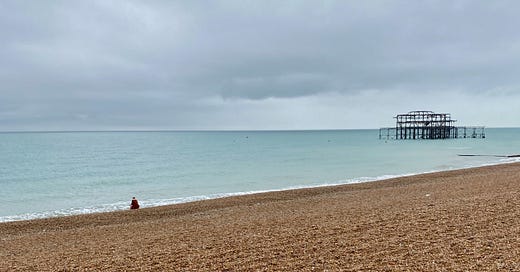I think this one’s about loneliness
Sometimes you have to chase the space you need to the other side of the country. Every kilometre of track an opening up, a casting wide.
I’ve travelled all day to Brighton for Coast is Queer, an annual literature festival held at the University of Sussex. The air is fresh, the discussion invigorating and the café is stuffed with people devouring books you won’t find in Waterstones. For once, I feel like an equal and fully-formed person.
It’s also my first chance to have a face-to-face session with the counsellor I’ve been speaking to through a computer screen for 2 years. Counsellors specialising in childless, queer, possibly neurodivergent life experience are hard to come by in rural Devon. Rocking up in person at their hired consulting room in Lewes, dishevelled by torrential rain and missed buses, is like falling through a fold in the universe.
I’ve been thinking about different ways we can feel adrift. Displacement has a long history in literature, its language of unbelonging now the global majority experience.
So what happens when your unsettlement is caused not by migration or displacement but its opposite - the impossibility of moving. What if the thing that’s out of your control is not your movement but your stasis?
In my current, tenuous day job, I work in a part of England with one of the lowest levels of social mobility in the country. There are neighbourhoods near me in which, no matter how hard you work, you cannot change your circumstances. This isn’t the story of Devon that you’ll read in the media.
Meanwhile, scientists report that changing our environment, pursuing novel experiences and meeting new people is the best way to make life feel longer and richer (Steve Taylor, Marc Whitman, reported in The Guardian 29.12.24). No wonder we can feel like we’re drifting when life shows an unchanging face, day after day after day.
And what happens if you’re in a space where you don’t fit, or can’t see your experience reflected around you? How do you find belonging, build identity, put down roots - processes that are frequently relational and connective?
My own relationship to the place I grew up is as fragile as rice paper. On the outside of every conceivable social and economic unit, driven out of scarce work, it’s difficult to survive here.
I orbit like space junk, counting meaningful connections on the fingers of one hand. Grasping them fiercely.




